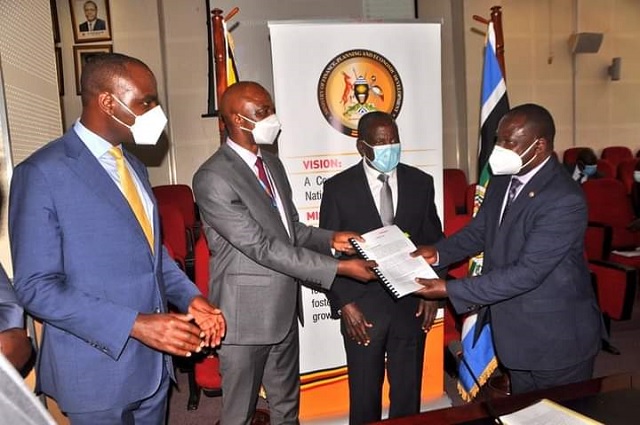
Kampala, Uganda | Ronald Musoke | Ramathan Ggoobi, the new Permanent Secretary in the Ministry of Finance, Planning and Economic Development who also doubles as the Secretary to the Treasury has officially assumed office almost a month after his appointment.
Patrick Ocailap, the Deputy Secretary to the Treasury who has been the Acting PS/ST handed over the Office to Ggoobi on Aug.18. The handover ceremony which took place at the Finance Ministry headquarters in Kampala was witnessed by Matia Kasaija, the Finance Minister and Henry Musasizi, the Minister of State for Finance (General Duties) among other senior Finance Ministry officials.
Ggoobi replaced long-serving Keith Muhakanizi who was moved to the Office of the Prime Minister in a July 15 reshuffle of Permanent Secretaries announced by President Yoweri Museveni.
Ggoobi thanked President Museveni for “entrusting him with the responsibility of leading the technical team that is going to direct the economic policy of Uganda, first, to recover the economy to its pre-pandemic state and ultimately push for socio-economic transformation through creation of well-paying jobs as well as enhancement of household incomes and wealth creation.”
“I am taking on this gigantic responsibility with full knowledge that like many other young nations, Uganda’s main challenge today is to build a sound economy and transform our society that is still largely pre-industrialist into a modern nation,” said Ggoobi.
Ggoobi begins his new role as the local economy which has been pummeled by the COVID-19 pandemic attempts to recover from the negative effects of lockdowns.
Uganda has gone through two nationwide shutdowns following the COVID-19 entry into the country’s borders in March, last year. According to statistics from the Ministry of Health, the Coronavirus has so far killed close to 3,000 people and infected almost 100,000 over the last 17 months.
In the middle of this year, Uganda experienced a much more virulent strain of the virus that devastated the country and left death and destitution among Ugandans. The government was forced to institute a 42-day lockdown in an attempt to stop thousands of people from succumbing to the pandemic.
The second wave, however, appears to have hit the economy severely and dimmed prospects for a quick recovery, according to the Bank of Uganda Monetary Policy Statement for August 2021.
“The second wave of COVID-19 and its associated containment measures have interrupted earlier economic recovery momentum following the first wave,” noted the BoU monetary Policy Statement for August 2021.
The Bank of Uganda, the country’s central bank, now projects that economic growth is unlikely to recover quickly and will range between 3.5 to 4% in Financial Year (FY) 2021/22. The Bank projects that the 6-7% growth rates which were recorded in the past by the Uganda economy will perhaps be possible again only in FY2024/25.
According to Bank of Uganda, respite can only come if vaccination picks-up later in the year. It adds that any economic rebound will depend on acceleration in private consumption due to pent-up local demand, strong growth in external demand, gradual return of tourism, the Final Investment Decision (FID) in the oil sector, and broad-based improvements in business confidence.
But, the Bank of Uganda noted, there are still many pull back factors that are sowing uncertainty. These include; failure to contain the pandemic through vaccination and observance of SOPs, emergence of vaccine resistance to COVID-19 variants, and re-introduction of restriction on gatherings and mobility.
There are also factors outside of the Ugandan economy, including risks associated with rising global commodity prices, especially of oil as economies fully open up.
These are all challenges that Ggoobi is expected to try to find solutions to. Ggoobi said he is happy he will be working with a team that is “professionally apt, largely young, dynamic, intelligent, hardworking, enthusiastic and efficient.”
 The Independent Uganda: You get the Truth we Pay the Price
The Independent Uganda: You get the Truth we Pay the Price



